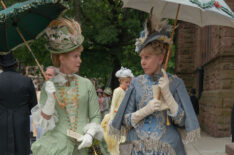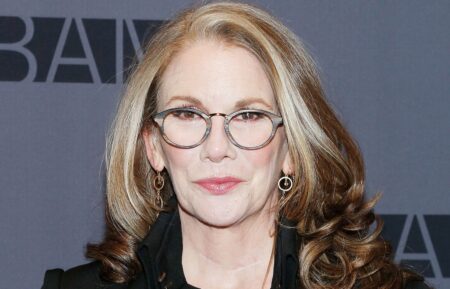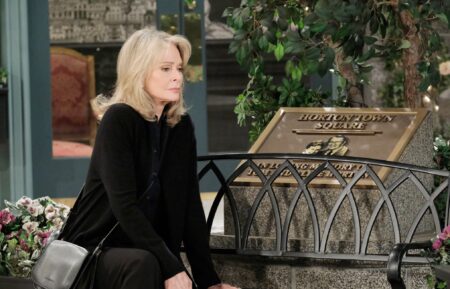‘The Gilded Age’ Season 2 Premiere: What Happened to Peggy’s Son? Julian Fellowes & Sonja Warfield Explain
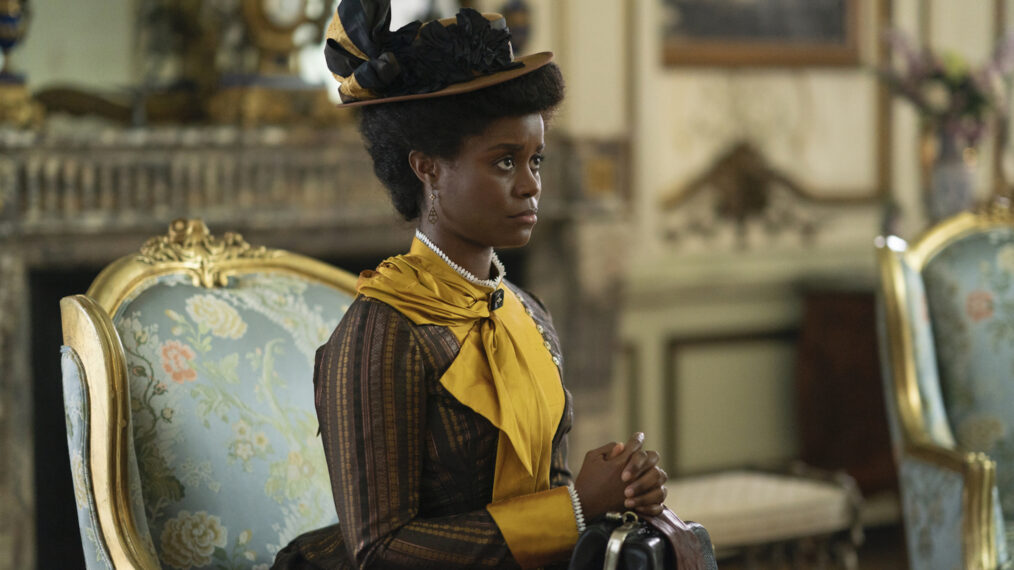
Spoiler Alert
[Warning: The following contains MAJOR spoilers for The Gilded Age Season 2 Episode 1.]
One of the biggest questions from The Gilded Age Season 1 finale was answered in The Gilded Age Season 2 premiere, which aired on Sunday, October 29 on HBO after a year-and-a-half hiatus. Last year’s finale revealed that Peggy Scott’s (Denée Benton) son was not stillborn like her father, Arthur (John Douglas Thompson), had made her believe. Rather, he had been living in Philadelphia with his adoptive family all this time.
The baby’s father was a stockboy at Arthur’s pharmacy that Peggy had fallen in love with. The baby was born after their elopement, but Arthur convinced her he was stillborn. Peggy was forced to annul her marriage, leading to her moving to Pennsylvania to attend the Philadelphia Institute for Colored Youth, meanwhile Arthur secretly had the baby adopted by a Black family in Philadelphia. She began working for Agnes van Rhijn (Christine Baranski) as a secretary upon her return to New York and spent much of Season 1 trying to find out what happened to her ex-husband through the help of lawyer Tom Raikes (Thomas Cocquerel, who does not return for Season 2).
The truth about her son was revealed by a note found in Arthur’s possession, and he justified his actions by saying he didn’t want Peggy to be “ruined” by being a single mother. An even deeper rift formed between Peggy and her father (and between Mrs. Scott, played by Audra McDonald, and Arthur) because of this, and she set her sights on returning to Philadelphia to find her son. The first episode of The Gilded Age Season 2 quickly gave a tragic update on her son’s whereabouts.
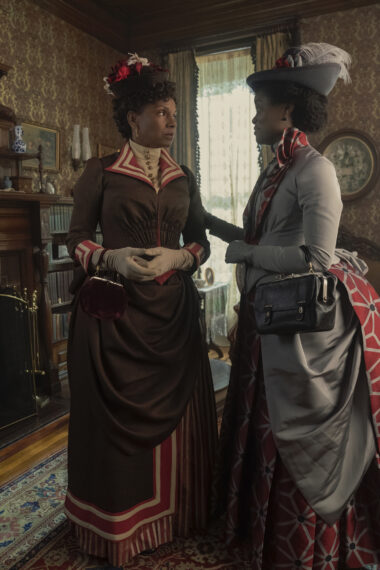
Audra McDonald and Denée Benton in ‘The Gilded Age’ Season 2 (Credit: Barbara Nitke/HBO)
As the Manhattan elite treks out for Easter mass in the premiere’s opening scenes, the Scotts arrive in Philadelphia to join Peggy’s son’s adoptive family, the Springs, in their grief. The 3-year-old child, named Thomas, tragically died of scarlet fever six months prior, as did his adoptive mother who caught the fever while nursing the toddler through his illness. The father was too grief-stricken to contact Peggy sooner, despite knowing she was looking for him.
Peggy and her parents are welcomed into the Spring’s home after visiting Thomas’ grave so she can get a sense of what her son and his “short and dear life” was like. As she peruses his room and asks about his personality, the father assures that they “wouldn’t have stopped” Peggy from seeing Thomas, had they connected sooner.
“Don’t be too nice to me,” Peggy says, her voice shaking. “I’d have taken him away. I’d have fought the adoption and I would’ve taken him with me if I could.”
“I wish you had,” the father admits. “It might’ve saved him if you got him out of the city before the fever came.”
Peggy’s gifted a photo of Thomas along with his favorite teddy bear, and the Scotts return to New York after Easter dinner. She then plans to get her job at the van Rhijn house back with Marian’s (Louisa Jacobson) help and shall continue her work as a journalist at T. Thomas Fortune’s (Sullivan Jones) newspaper moving forward.
Series creator Julian Fellowes serves as a writer and executive producer on The Gilded Age, his followup to Downton Abbey. Sonja Warfield executive produces and writes along with him. Fellowes and Warfield tell TV Insider that there was never an alternative opening for Peggy considered when creating Season 2. Peggy’s grief drives her plot forward in the coming episodes, which will see her diving into her work as a distraction from the pain.
“I mean, the child couldn’t continue to be alive,” Warfield says with a pained, “I’m sorry for saying it that way” look. “It would have complicated things” in a way that wasn’t conducive to the Peggy story they wanted to tell this season.
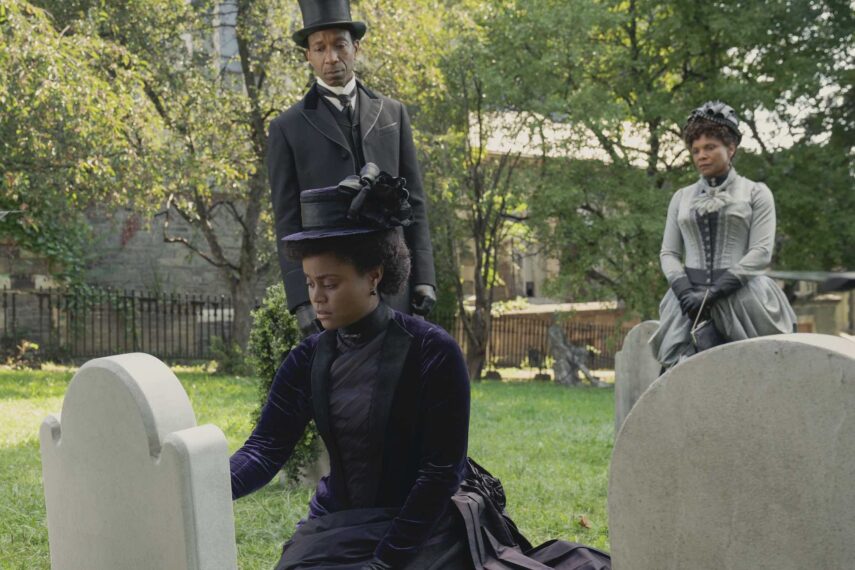
Peggy visits her son’s grave in ‘The Gilded Age’ Season 2 premiere (Courtesy of HBO)
“It would have limited her possibilities as a character to greater degree,” adds Fellowes. “I mean, she’s already a Black woman trying to be accepted as an author, a woman trying to get published in journalism. To have an illegitimate child on top of that” would have stacked too many cards against Benton’s character. Warfield nods in agreement.
“That was our thinking, that dramatically we couldn’t take it forward in a way that expanded the character of Peggy in the direction we wanted to go in,” Fellowes clarifies.
Peggy won’t have much of an outlet for her grief in future episodes. “Back then people didn’t speak of such things, so they didn’t really talk about” their emotional struggles, Warfield explains. Peggy will fill that absence by advocating for a better world through journalism. “She needed to really submerge herself in something else and remind herself that there is life out there, that she does have a future and a career, and to put [her grief] behind her,” says Warfield.
An assignment covering the Tuskegee Institute in Alabama will have a great impact on Peggy. As Warfield shares, “Seeing these young Black people learning and growing and doing things will inspire her and help her to move past this dark period of her life and look towards the future.”
“I think what she’s trying to do is to pack her life with her work and her ambition so that she’s moving forward and not sitting there in a sort of pool of remorse,” Fellowes says. “And I think, as happens, her enthusiasm to be occupied and to be busy and not to have to think too much actually engenders a real ambition to be a serious journalist and to get further into it because of what she can write about.”
This noble pursuit allows viewers to see more of the Black elite of Brooklyn as the season progresses, which is a welcome expansion and contrast to the lower-stake issues facing the old and new money elites of Manhattan. As for Peggy’s relationship with her parents (and Dorothy and Arthur’s now-strained marriage), time and care may heal all wounds.
The Gilded Age, Sundays, 9/8c, HBO, Streaming on Max
From TV Guide Magazine
'America's Got Talent': Simon Cowell Teases Big Changes in Season 20 as Mel B. Returns
The show’s judges and host preview the landmark season and reflect on how they’re keeping it fresh. Read the story now on TV Insider.

